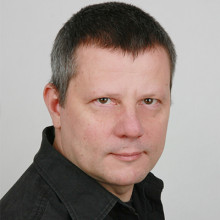Polish literature

Wojciech Chmielewski
(born in 1969 in Warsaw) history and journalism graduate at the University of Warsaw, prose writer, essayist, and literary critic, the author of radio plays. He worked as the editor in, among others, Wydawnictwa Szkolne i Pedagogiczne.
He made his debut in 2003 in the pages of „Nowa Okolica Poetów” with a short story Biały bokser (White boxer). Afterwards, he published in various magazines, inter alia, „Odra”, „Arcana”, „Wyspa”, „Borussia”. Until 2016, he regularly collaborated with the newspaper „Rzeczpospolita”, where, in the supplement „Plus Minus”, were published his short stories along with his essays and reviews devoted mainly to the latest prose. He gained recognition as a prose writer and especially as a short story writer. His debut collection of short stories Biały bokser (2006) got him an honourable mention in Józef Mackiewicz Literary Awards, whereas the volume Brzytwa (Razor) was nominated to Cogito Public Media Awards. Chmielewski strikes the critics as the continuator of realistic movement in modern Polish prose, referring to the work of Marek Nowakowski and Kornel Filipowicz, to mention a few. The writer himself confessed in one of the interviews, „I am rather a realist, that is, I try to depict reality as plausibly as my imagination allows it.” („Arcana” 2015, nr 122). Kazimierz Orłoś, when recommending Chmielewski’s first book, emphasised that the writer describes „the world as he knows it, and the people whom he has seen”. It applies especially to Warsaw’s outskirts, where a large part of the works by the Razor’s author takes place. The protagonists of his prose are usually average, lost, lonely people who find themselves on the margins of life and are marked by the syndrome of failure. They often represent the generation of Martial Law Poles, entering adulthood in Third Polish Republic, remembering communism and facing the world of modernity. By creating their profound mini psychological portraits, the writer poses a question, „what is in a human”, seeking for something unique in seemingly banal characters. In their dilemmas, the critics sought a sociological study of today’s Poland and even its critical diagnosis. Although Chmielewski is most interested in contemporary times, it is significant for him to emphasise its relationship with the past, even the very distant past. What is also characteristic in this writing is the presence of discreet yet „scattered” metaphysics (S. Buryła). The writer often „moves from a precise, factual description to a higher level of delving into the human condition” (M. Nowakowski). Spiritual, religious quandaries of his protagonists are often confronted with the trivial, sometimes brutal dailiness of their existence, ultimately leading to „difficult optimism” (S.Buryła), thus to the acceptance of the world in its most ordinary manifestations. Chmielewski is close to the concept of language as a tool for diagnosing reality. His prose is distinguished by stylistic restraint and conciseness. He is marked out for his linguistic hearing and sensitivity to sensual precision. The works by the author of Razor are also characterised by considerable formal diversity. There can be found prose miniatures, images resembling quasi-reportage or short scripted scenes, but also classical novellas and short stories, a voluminous story (Belweder gryzie w rękę [Belveder bites on the hand], 2017), and finally a novel Kawa u Doroty (Coffee at Dorothy’s), 2010.
– Maciej Urbanowski
BIBLIOGRAPHY
Short stories:
- Biały bokser, Warszawa: Oficyna Wydawnicza „Agawa”, 2006.
- Brzytwa, Warszawa: Czytelnik, 2008.
- Najlepsza dentystka w Londynie, ilustrował M. Suffczyński, Kraków: Wydawnictwo ARCANA, 2014.
-
Magiczne światło miasta, Kraków: Wydawnictwo ARCANA, 2018.
Stories and novels:
- Kawa u Doroty, Warszawa: Czytelnik 2010.
- Belweder gryzie w rękę, Warszawa: Iskry, 2017.
-
Jezioro Dargin, Warszawa: Czytelnik 2021.
Radio plays:
- Wybieram milczenie, PR, broadcast 2008.
- Kochankowie z Warszawy, PR, broadcast 2008.
- Powiedz im to, aniele, PR, broadcast 2009.
- Pani Dafina, PR, broadcast 2010.